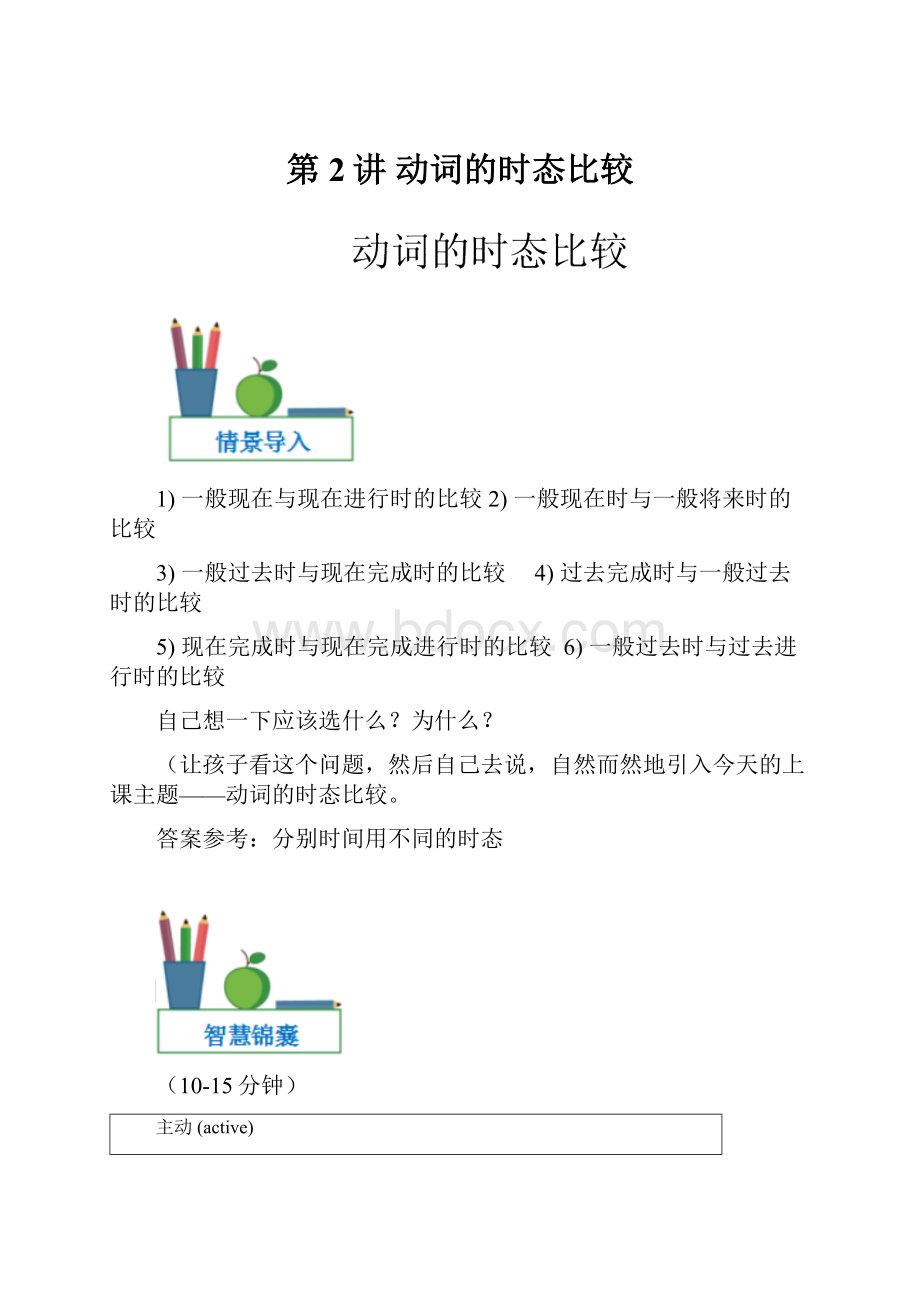第2讲动词的时态比较.docx
《第2讲动词的时态比较.docx》由会员分享,可在线阅读,更多相关《第2讲动词的时态比较.docx(15页珍藏版)》请在冰豆网上搜索。

第2讲动词的时态比较
1)一般现在与现在进行时的比较2)一般现在时与一般将来时的比较
3)一般过去时与现在完成时的比较 4)过去完成时与一般过去时的比较
5)现在完成时与现在完成进行时的比较 6)一般过去时与过去进行时的比较
自己想一下应该选什么?
为什么?
(让孩子看这个问题,然后自己去说,自然而然地引入今天的上课主题——动词的时态比较。
答案参考:
分别时间用不同的时态
(10-15分钟)
主动(active)
一般
进行
完成
完成进行
现在
does/do
is/am
/aredoing
has/have
done
has/have
beendoing
过去
did
was/weredoing
haddone
Hadbeendoing
将来
shall/willdo
(begoingtodo)
shall/willbedoing
shall/willhavedone
shall/willhavebeendoing
Passive(被动)
一般
进行
完成
完成进行
现在
is/am/are
done
is/am/are
beingdone
has/have
beendone
has/have
beenbeing
done
过去
was/were
done
was/were
beingdone
hadbeen
done
hadbeen
beingdone
将来
shall/will
bedone
shall/will
havebeendone
1)一般现在与现在进行时的比较
eg.
1.Don’tputthedictionaryaway.I___(use)it.(Key:
amusing)
2.Don’tputthedictionaryaway.I___(need)it.(Key:
need)
进行时只表在某时,某阶段发生的动作。
一般现在时表经常性,习惯性的动作,状态。
有些表感觉,状态的动词没有进行时。
know,like,want,see,prefer,need,wish,remember,hate,want,guess,mean,
think,seem,mind,have,belong,believe…
但当以上词转义时可用进行时:
1.I’mnowhavingsportswithmyfriend.
2.Youarewantingonthephone.
3.Whoisseeingyouoffthisafternoon?
4.(NMET2000北京春季,14)—You'redrinkingtoomuch.
—Onlyathome.Noone_______mebutyou.
A.isseeingB.hadseenC.seesD.saw(Key:
C)
eg.“Areyouready,Ann?
”“Yes,I’mcoming.”
stay,go,come,study,leave,arrive,return,fly,get,meet,seeoff…
一些不及物动词可用“bedoing”表示即刻将来.
be(always)doing
eg.---I’mafraidI’velostmykeyagain.
2)一般过去时与现在完成时的比较
eg.Tomhaslosthiskey.
Hecan’tgetintothehouse.
Tomlosthiskeyyesterday.
Hecouldn’tgetintothehouse.
现在完成时:
强调目前的动作和状态.过去时:
说明过去的和动作状态.与现在无关.
eg.“OW!
Ihaveburntmyfinger.Ithurts.”
“Howdidyoudothat?
”
“Ipickedupahotdish.”
b)现在完成时用于提供新的信息,但如果继续谈动作本身,要用过去时,因为动作发生在过去.
eg.Shakespearewrotemanyplays.
IonceworkedinAfricaforthreeyears.
Mysisterisawriter.Shehaswrittenmanybooks.
C)如果动做与现在无关,不用现在完成时.
3)过去完成时与一般过去时的比较
eg.
Wehadlearned3,000newwordsbytheendoflastterm.
(lastyear/lastmonth….)
2.Hehadlearnedadvancedmathematicsallbyhimselfbythetimehewas14.
3.Hehadbeenaworkerbeforehebecameateacher.
4.Whenhegottothecinema,theticketshadbeensoldout.
过去完成时:
主要表示过去某一时间前已发生的动作,存在的状态.
a)典型时间状语:
eg.Wehadlearned3,000newwordsbytheendoflastterm.(lastyear/lastmonth…)
Hehadlearnedadvancedmathematicsallbyhimselfbythetimehewas14.(themoment
hecameback…/theyearhegraduatedfrommiddleschool…/bythen…)
Hehadbeenaworkbeforehebecameateacher.
Whenhegottothecinema,theticketshadbeensoldout.
ThiswasthebestmealIhadeverhad.
4)现在完成时与现在完成进行时的比较
现在完成时:
强调动作结果。
现在完成进行时:
强调动作本身。
eg:
Lihasbeentypinglettersthewholemorning.
Lihastypedsixletterstoday.
Howlonghaveyoubeenreadingthebook?
Howmanypagesofthebookhaveyouread?
XiaoMinghasbeenplayingfootballsince4.
XiaoMinghasplayedfootball3timesthisweek.
5)一般过去时与过去进行时的比较
a)过去进行时:
(1)过去某时,某一阶段正在进行的动作。
eg.“Becareful.Don’tthrowyourcigaretteoutofthewindow.”
“Sorry.Iwasn’tthinking.”
常用典型时间状语:
atthattime,atninelastnight,atthesametimelastyear…
(2)过去某一动作发生的同时,另一动作正在发生。
(上下文)
eg.WhenIknockedatthedoorshewascooking.
Theyallworkedhard,andeveryoneknewwhathewasworkingfor.
Theyshowedusaroundthefactorytheywerebuilding.
ThestudentswereworkingbusilywhenMissBrownwenttogetabookshehadleftintheoffice.
b)过去完成时与过去时的区别:
如果“过程”为强调的内容,即:
表述动作先后用过去完成时.
如果“动作”为强调的内容,即:
表述动作何时,何地…用过去时.
eg.
IfeltverytiredwhenIgothome.SoI___(go)straighttobed.
ThehousewasveryquietwhenIgothome.Everybody___(go)tobed.
2.SorryI’mlate.Thecar___(break)downonmywayhere.Key:
broke
Weweredrivingalongtheroadwhenwe___(see)acarwhich___(break)down,sowe
___(stop)toseeifwecouldhelp.K
3.Ann___(notbe)athomewhenIphoned.She__(be)inLondon.
Ann___just(get)homewhenIphoned.She___(be)inLondon.
4.“WasTomtherewhenyouarrived?
”
“No,he___(go)home.”
“WasTomtherewhenyouarrived?
”
“Yes,buthe___(go)homesoonafterwards.”
5.Thelittlegirl___(cry)herheartoutbecauseshe___(lose)hertoybearandbelievedshewasn’tevergoingtofindit.
6.JohnandIhavebeenfriendsforeightyears.Wefirst___(get)toknoweachotherataChristmasparty.Butwe___(see)eachother
acoupleoftimesbeforethat.
7.---Oh!
It’syou!
I____(notrecognize)you.
---I’vejusthadmyhaircutandI’mwearingnewglasses.8.ThepenI___(think)I___(lose)isonmydesk,rightundermynose.
C)过去完成时有时可表示一个打算做而没做的事.
hope,think,plan,mean,want,expect….
eg.1.Ihadthoughthewouldtellmeaboutthat,buthedidn’t.
2.Ihadhopedtocatchthe9:
30train,butfounditgone.
3.IhadmeanttogoonMonday,buthavestayedon.
d)用于固定句型
…hardly…when…
…nosooner…than…
…scarcely…before…
eg.1.Wehadscarcely(or:
Scarcelyhadwe)gatheredinthegrainbeforeitbegantorain.
2.Ihadnosooner(or:
NosoonerhadI)reachedhomethanhecametovisitme.
3.Hehadhardly(or:
Hardlyhadhe)arrivedwhenshestartedcomplaining.
(15-20分钟)
Ex.
1.I___(think)ofsellingmycar.Wouldyoubeinterestedinbuyingit?
(
2.I___(think)youshouldsellyourcar.You___(notuse)itveryoften.
3.ShetoldmehernamebutI___(notremember)itnow.
4.---___Colin___(work)thisweek?
---No,he’sonholiday.
5.---HowisyourEnglish?
---It__(get)better.
6.Iwanttoloseweight,sothisweek.I___(noteat)lunch.
bedoing
---Notagain!
Youarealwayslosingyourkey.
Mysonisalwaysdoingverywellinschool.
“bedoing”与“always”或“constantly”连用时表达感情倾向.或褒或贬.
Ex.
1.---Thecarhasbrokendown.
---Thecarisuseless!
It___always____(break)down.2.---Oh,I’veleftthelightsonagain.
---Typical!
You__always(leave)thelightson.
Ex.
1.Excuseme.Whattime___thistrain___(get)toLondon.
2.---CanyoucomeonMondayevening?
”
---SorrybutI___(play)volleyball.
3..Theartexhibition___(open)onMay3rdand___(finish)onJuly15th.
4.Sue___(come)toseeustomorrow.She___(travel)bytrainandhertrain___(arrive)at10:
15.……………………………….Key:
.iscoming./istraveling/arrives
I___(meet)heratthestation.
5.I’mtootiredtowalkhome.IthinkI__(get)ataxi.
6.Ican’tmeetyoutomorrowafternoon.I___(play)football.
7.---Ineedsomemoney.
---OK.I___(lend)yousome.Howmuchdoyouneed?
8.---DidyouphoneRuth?
---Ohno,Iforgot.I___(phone)hernow.
9.He___(leave)whenthetelephonerang.
Ex.
1---___yourfather___(come)back?
---Yes,he___(come)backyesterday.
2.Thisisthefourthtimeyou___(be)late.
3.Jackgrewabeardbutnowhe___(shave)itoff.
4.IdidGermanatschoolbutnowI___(forget)mostofit.
5.ImeanttophoneDianelastnightbutI___(forget).
6.---Yourhairlooksnice.___you___(have)ahaircut?
---Yes.
---Who___(cut)it?
___you___(go)tothehairdresser?
”
---No,afriendofmine___(do)itforme.
7.Allthepreparationsforthetask___(complete),andwe’rereadytostart.
8.ThisisTed’sphoto.Wemisshimalot.He___(kill)tryingtosaveachildintheearthquake.
Ex.
1.You___(smoke)toomuchrecently,youshouldsmokeless.
2.Mybikeisgoingagainnow.XiaoWang___(repair)it.
3.“WhyareXiaoWang’shandssodirty?
”
“He___(repair)mybike.”
4.She___(read)abooknow.
She___(start)twohoursago.
She___(read)fortwohours.
She___(read)45pagessofar.
(10-15分钟)
Ifirstmether3yearsago.She___(work)ataradioshopatthattime.
2.“Whydidn’tyousayhellotohim?
”
“I___(notlook)thatway.”
3.Idon’tthinkJimsawme.
He___(stare)intospace.
4.“Excuseme,sir.Wouldyoudomeafavor?
”
“Ofcourse.Whatisit?
”
“I___(wonder)ifyoucouldtellmehowtofillouttheform?
”
5.Tomslippedintothehousewhennoone____(look).
6.ThelasttimeI___(see)Jane,she___(pick)cottoninthefields.
7.Asshe___(read)thenewspaper,Granny___(fall)asleep.
8.Shirley___(write)abookaboutChinalastyearbutIdon’tknowwhethershehasfinishedit.
Ex.
Shedidn’tgotobeduntilshe___(finish)herwork..
2.Sheshowedmethepictureshe___(take)formeonthegreatwall.
3.WiththeirhelpIrealizedthatI___(be)wrong.
4.Theyfinishedthejobearlierthanwe___(expect).
5.Thiswasthebestfilmwe___(seen).
6.He___(leave)beforeIcouldsay“Thanks”tohim.
7.They___(know)eachotherbeforetheygotmarried.
Exercises
UsuallyIenjoyparties,butI___thisoneverymuch.
A.don’tenjoyB.haven’tenjoyed
C.amnotenjoyingD.won’tenjoy
2.---Look!
Someonehasspiltcoffeeonthecarpet.
---Well,it___me.
A.isn’tB.wasn’tC.hasn’tbeenD.hadn’tbeen
3.Yourcarlooksveryclean.___you___it?
A.Did,washB.Had,washedC.Have,washedD.Do,wash
4.---Benhasbrokenhisleg.
---Really?
How_____?
A.didthathappenB.hasthathappened
C.hadthathappenedD.doesthathappen
5.Ouch!
I’vecutmyfinger!
It____.
A.hasbledB.bleedsC.isbleedingD.bled
6.Wedidn’tgetmuchsleeplastnightbecausethepeoplenextdoor___anoisyparty.
A.havehadB.werehavingC.hadhadD.have
7.---Canyoudrive?
---I___.Myfatherteachesme.
A.havelearnedB.amlearningC.learnedD.willlearn
8.Iamcallingtosaygoodbyetoyou.
When__you____?
A.will,leaveB.are,leavingC.do,leaveD.are,toleave
9